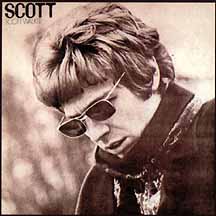- Mathilde
- Montague Terrace (In Blue)
- Angelica
- The Lady Who Came from Baltimore
- When Joanna Loved Me
- My Death
- The Big Hurt
- Such a Small Love
- You're Gonna Hear From Me
- Through a Long and Sleepless Night
- Always Coming Back to You
- Amsterdam

[Back to Scott's CD's] [Back to Home]
|
 |
This is the album which Scott called "my obsession", and it is an LP for which you must open not only your ears but also your heart and your mind.
There is a great honesty of purpose in the selection of these songs by Scott for his first solo showcase, and the result is a fine example of original expression and unique interpretation.
"Solo" should have been this artist's middle name, and if it were necessary to find any further proof that "loneliness is not just a cloak he wears" but a state of mind, it is here in his own compositions - "Montague Terrace (in blue)", "Always coming back to you", and the cold ethereal beauty of "Such a small love - such a little tear".
These three songs are almost an intrusion of privacy, and the points are barbed - but so superbly made that you must realise that like "The bullfight" this is no idle "sport" but a matter of life and death, and the hope that you too will be aware. There are some artistic people who perform through a sense of urgency which is almost a despair, so acute is their anxiety to communicate. Often they are the young. The late James Dean and Montgomery Clift seem to burn themselves up from within on the Screen. Bob Dylan's early songs and the tortured voice of Ray Charles have this emotional quality, and occaisonally the voice of experience breaks the same barrier - Sinatra has it, and Piaf had it. There is an indefinable element within the work of these people which is an expression of their own being. Scott Engel has this same gift of communication and the intensity with which he interprets the three introspective works of Jacques Brel approaches musical genius. Scott's version of Brel's "Amsterdam" is a raw magnificently honest one, and superbly orchestrated. "Mathilde" is a shattering piece of vocal dramatics guaranteed to stop the show, and for a moment almost the World. "My death" is the hurt of a voice crying in a wilderness; but what a splendid lust for life as well.
You cannont explain pain, either physical or mental, to someone who has never experienced either, but mental anguish can become so solid and tangible a thing that it can become "The big hurt", and the success of this track relies on the interpretation and timbre of Engel's voice. "There are some songs that you hear famous and gifted vocalists perform and you think, 'My god, I would like to get my hands on that song', and when you have been lucky enough to do this, as I have now, there is great satisfaction," says Scott. Such a song is Tony Bennett's "When Joanna Loved me" and to follow Bennett you have to be good. One other track which must be mentioned by that broken singer of broken songs, Tim Hardin. "The Lady comes from Baltimore" is a sad, cracked little tune which Scott sings with the gentle touch of one who knows the package is fragile.
And while we applaud the result of this musical journey through Scott's mind we must not forget those sensitive arrangements by Wally Stott, Reg Guest and Peter Knight who have conjured "musical spirits from the vasty deep" for these inspired orchestral settings.
When Scott Engel (I use the surname because it is his real name and I know few more real people) sang with The Walker Brothers, he had a little-boy-lost image, but this album is a man's work, and the portent of greater things to come. Should some of the truth on this album offend, should the light be too bright for some, we might be permitted the device of using the words of another young man who wrote with the fire of burning youth: "Beauty is truth, truth beauty - that is all. That is all ye know on earth, and all ye need to know." - John Keats.
Keith Altham